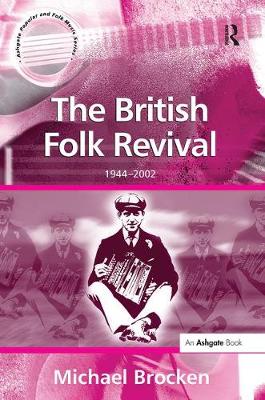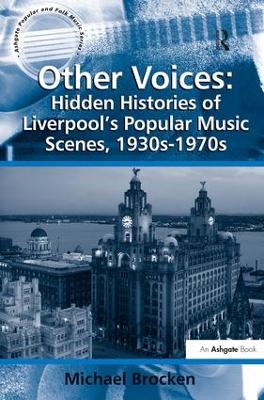Ashgate Popular and Folk Music
3 total works
This title was first published in 2003. This work considers the post-war folk revival in Britain from a popular music studies perspective. Michael Brocken provides a historical narrative of the folk revival from the 1940s up until the 1990s, beginning with the emergence of the revival from within and around the left-wing movements of the 1940s and 1950s. Key figures and organizations such as the Workers' Music Association, the BBC, the English Folk Dance and Song Society, A.L. Lloyd and Ewan MacColl are examined closely. By looking at the work of British Communist Party splinter groups it is possible to see the refraction of folk music as a political tool. Brocken openly challenges folk historicity and internal narrative by discussing the convergence of folk and pop during the 1950s and 1960s. The significant development of the folk/rock hybrid is considered alongside "class", "Americana", radio and the strength of pop culture. Brocken shows how the dichotomy of artistic (natural) versus industry (mass-produced) music since the 1970s has led to a fragmentation and constriction of the folk revival. The study concludes with a look at the upsurge of the folk music industry, the growth of festivals and the implications of the Internet for the British folk revival. Brocken suggests the way forward should involve an acknowledgement that folk music is not superior to but is, in fact, a form of popular music.
The British Folk Revival is the very first historical and theoretical work to consider the post-war folk revival in Britain from a popular music studies perspective. Michael Brocken provides a historical narrative of the folk revival from the 1940s up until the 1990s, beginning with the emergence of the revival from within and around the left-wing movements of the 1940s and 1950s. Key figures and organizations such as the Workers' Music Association, the BBC, the English Folk Dance and Song Society, A.L. Lloyd and Ewan MacColl are examined closely. By looking at the work of British Communist Party splinter groups it is possible to see the refraction of folk music as a political tool. Brocken openly challenges folk historicity and internal narrative by discussing the convergence of folk and pop during the 1950s and 1960s. The significant development of the folk/rock hybrid is considered alongside 'class', 'Americana', radio and the strength of pop culture. Brocken shows how the dichotomy of artistic (natural) versus industry (mass-produced) music since the 1970s has led to a fragmentation and constriction of the folk revival. The study concludes with a look at the upsurge of the folk music industry, the growth of festivals and the implications of the Internet for the British folk revival. Brocken suggests the way forward should involve an acknowledgement that folk music is not superior to but is, in fact, a form of popular music. The book will create lively debate among the folk music fraternity and popular music scholars, as well as folklorists and ethnomusicologists. A unique discography and history of the Topic Record label is also included.
Other Voices: Hidden Histories of Liverpool's Popular Music Scenes, 1930s-1970s
by Michael Brocken
Published 28 December 2009
At times it appears that a whole industry exists to perpetuate the myth of origin of the Beatles. There certainly exists a popular music (or perhaps 'rock') origin myth concerning this group and the city of Liverpool and this draws in devotees, as if on a pilgrimage, to Liverpool itself. Once 'within' the city, local businesses exist primarily to escort these pilgrims around several almost iconic spaces and places associated with the group. At times it all almost seems 'spiritual'. One might argue however that, like any function myth, the music history of the Liverpool in which the Beatles grew and then departed is not fully represented. Beatles historians and businessmen-alike have seized upon myriad musical experiences and reworked them into a discourse that homogenizes not only the diverse collective articulations that initially put them into place, but also the receptive practices of those travellers willing to listen to a somewhat linear, exclusive narrative. Other Voices therefore exists as a history of the disparate and now partially hidden musical strands that contributed to Liverpool's musical countenance. It is also a critique of Beatles-related institutionalized popular music mythology. Via a critical historical investigation of several thus far partially hidden popular music activities in pre- and post-Second World War Liverpool, Michael Brocken reveals different yet intrinsic musical and socio-cultural processes from within the city of Liverpool. By addressing such 'scenes' as those involving dance bands, traditional jazz, folk music, country and western, and rhythm and blues, together with a consideration of partially hidden key places and individuals, and Liverpool's first 'real' record label, an assemblage of 'other voices' bears witness to an 'other', seldom discussed, Liverpool. By doing so, Brocken - born and raised in Liverpool - asks questions about not only the historicity of the Beatles-Liverpool narrative, but also about the absence o


